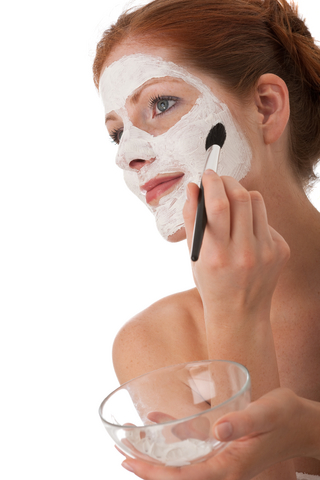Since 2000 BC oatmeal has been used as a soak or poultice to relieve irritated, dry, itchy and inflamed skin. Whether in the bath or applied topically, oatmeal has been shown to help heal everything from bug bites to sunburns. A colloidal oatmeal mask is a safe, easy and inexpensive way to have beautiful smooth skin.
Besides the healing properties, oatmeal also cleanses the skin. Oatmeal contains chemicals called saponins that help remove dirt and oil from the skin. Oatmeal also acts as a moisturizer due to its natural fat content and because of the vitamins and polysaccharides contained in oatmeal it helps to nourish the skin.
To maximize the chemical effects of oatmeal, colloidal (powdered) oatmeal should be used. The high concentration of polysaccharide (complex sugars) in colloidal oatmeal forms a protective film on the skin that physically holds the skins moisture. This film also helps to repair and maintain the skins natural protective barrier and is effective for lasting healing benefits. Colloidal oatmeal softens and nourishes the skin making it perfect as an oatmeal mask or bath additive.
Colloidal oatmeal may be purchased or made at home.
To make colloidal oatmeal at home:
- Put raw uncooked oats into a grinder or blender. A coffee grinder works well for this.
- Grind the oats until they have the consistency of flour.
To make sure that the oats have been ground to the correct fineness, add a teaspoon of the ground oats to a glass of water and mix. The oats should absorb the water quickly giving it a milky look. If the particles sink readily to bottom of the glass, grind them a bit longer and retest.
Yogurt and honey make excellent accompaniments to the colloidal oatmeal mask for the following reasons:
Yogurt benefits:
- Yogurt has both antifungal and antibacterial qualities.
- It cleanses and opens clogged pores.
- Plain low-fat or whole-milk yogurt contains lactic acid, which softens the skin, reduces wrinkles and hydrates dry areas.
Honey benefits:
- Honey has proven to have healing properties.
- Topically, honey stimulates new tissue growth.
- The amino acids in honey make it an excellent humecant (moisture retainer).
- Honey also acts as an exfoliant. It contains mild alpha hydroxy acids.
- Honey is an antioxidant and antioxidants destroy free radicals therefore reversing skin damage. Dark honey contains more antioxidants than light honey.
- Honey is good for treating minor acne and skin irritations.
- Honey also has antiseptic, antibacterial and antifungal properties. Raw honey (before pasteurization), contains propolis (resin collected by bees from plants), bee pollen and other elements. Propolis gives honey its antibacterial properties. The quantity of propolis varies greatly between types of honey. We suggest using Manuka honey.
Simple Colloidal Oatmeal Mask Recipe – for all skin types
Ingredients:
- 1 tbsp colloidal oatmeal
- 1 tbsp live plain organic yogurt
- 1/2 tbsp raw honey (Many healing properties of honey are destroyed during processing.)
Preparation:
1. Pour oatmeal into a small bowl and stir in the yogurt and honey creating a paste. Let stand for 5 minutes.
2. Cleanse face with warm water. While skin is still damp, apply mixture to your face using a gentle circular pattern. Avoid eyes and mouth. This is the exfoliating step.
3. Leave on for 10 minutes. This is the deep cleansing step that will remove impurities.
4. Remove paste with lukewarm water and a washcloth. Apply your favorite moisturizer. Be certain that your moisturizer contains no oils that clog pores. (A thin application of olive oil is a great option for most skin types.)
In order to reap maximum benefits from the colloidal oatmeal mask, apply mask once or twice a week. For sensitive skin, apply every other week.
Now go have fun and relax.
Related Posts:
Homemade Conditioner – Colloidal Oatmeal
Colloidal Oatmeal – A Really Really Simple Bath for Dry Itchy Skin

